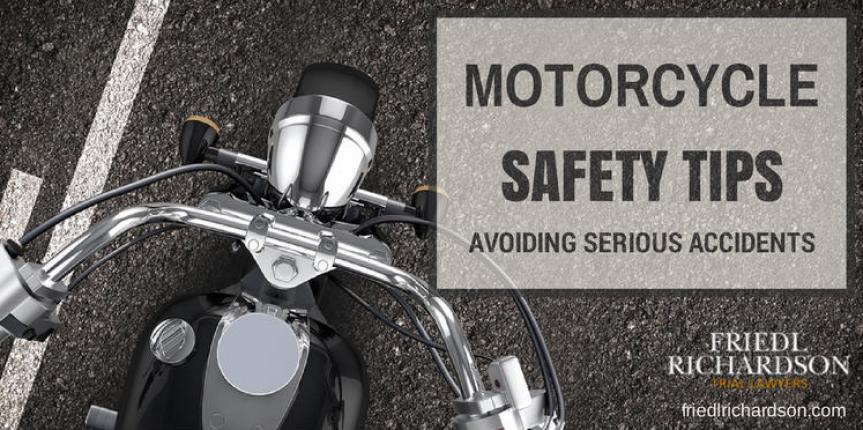Avoid Serious Accidents with these 5 Motorcycle Safety Tips
The Center for Disease Control presents several alarming statistics about motorcycle accidents on its website, For example, did you know that the number of deaths due to motorcycle accidents doubled between 1999 and 2008, which included over 34,000 fatalities? Some of the most recent annual statistics are from 2012 for motorcycle fatalities. 2012 showed a 7% increase from 2011 with 4,957 motorcycle fatalities. In addition, nearly 1,223,000 people suffered injuries serious enough to demand emergency treatment.
If you are a licensed motorcyclist, the risk of being involved in a deadly accident is 35 times higher than for vehicle drivers/passengers.
Applying these motorcycle safety tips when you hit the road on your favorite bike can significantly reduce your risk of being severely injured in an accident.
ARIZONA RANKS ONE OF THE HIGHEST IN MOTORCYCLE DEATH RATES
According to the National Traffic Highway Safety Administration Arizona and many other southern states with long riding seasons continue to have the highest motorcycle fatality rates across the United States.
5 Important Motorcycle Safety Tips
- 1. Wear a Helmet[space height"10"]
The U.S. National Highway Traffic and Safety Administration reports that wearing a helmet increases your chance of surviving an accident by as much as 40 percent. Although it is legal in Arizona to not wearing a helmet while riding a motorcycle, be aware that it may be illegal in your state to ride a motorcycle without a helmet. Tickets, fines and possible suspension of your license is possible if you are caught riding a motorcycle without a helmet. According to the NHTSA "motorcycle helmets DO NOT interfere with rider's vision or hearing". - 2. Wear Protective Clothing[space height"10"]
In addition to wearing a helmet, protecting the rest of your body by wearing goggles, leather gloves, boots and long pants may help minimize abrasions and lacerations if you are in an accident. Wearing brightly colored clothing also makes it easier for other motorists to see you, especially on a crowded interstate. - 3. Avoid the Blind Spot[space height"10"]
Slow down, avoid driving into a vehicle's blind spot, don't be aggressive and never assume other drivers know you are there. Always remember that half of all drivers are typically distracted drivers who do not have their full attention on the road. Whether it's talking on a cell phone, texting, eating or telling the kids in the back seat to be quiet, drivers are usually not aware that a motorcycle is near them--unless it is directly in front of them. - 4. Be Mindful of Road Hazards[space height"10"]
Remain vigilant about all aspects of the road. Road hazards such as debris, potholes, loose gravel, bridge joints that are open and wide and excessive wildlife cause thousands of potentially avoidable motorcycle accidents each year. - 5. Do Regular Maintenance[space height"10"]
Just like a car, your motorcycle needs oil changes and tune-ups to function properly on the road. Prolonging the viability of your bike by performing preventative maintenance means regularly checking to ensure the horn, headlights and turn signals work. Tire tread and pressure needs inspected periodically as well to avoid blowouts or difficulty steering the bike.
Common Types of Motorcycle Injuries
Fractures, lacerations and severe abrasions are injuries typically suffered by motorcyclists in an accident. Additionally, many motorcyclists who refuse to wear a helmet may endure coma or death due to traumatic brain injuries, skull fractures or spinal cord injuries.
If not fatal, brain injuries may result in:
- Permanent brain damage (inability to talk, read or grasp simple ideas)
- Recurring seizures and/or permanent paralysis
- Decreased coordination and motor skills
- Amnesia and/or memory loss
- Inability to retain employment
- Psychological issues such as depression, aggression, panic disorders or PTSD
Recovering from a brain injury due to a motorcycle accident can be emotionally and financially devastating. For motorcyclists involved in an accident through no fault of their own, compensation for all medical bills as well as pain and suffering may be available. Finding a trial ready personal injury attorney with experience in motorcycle accident cases can be your best friend in a time like this.








